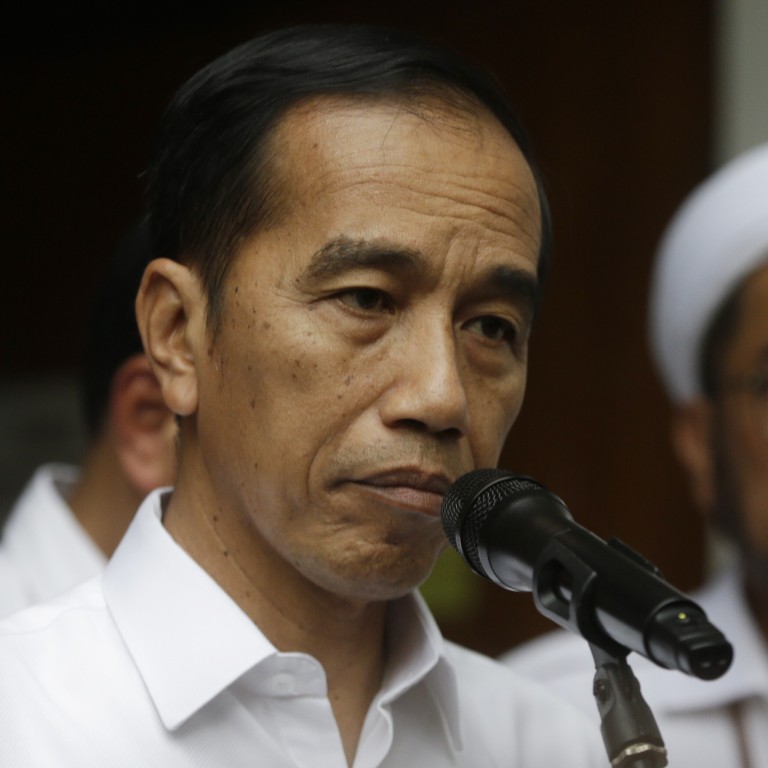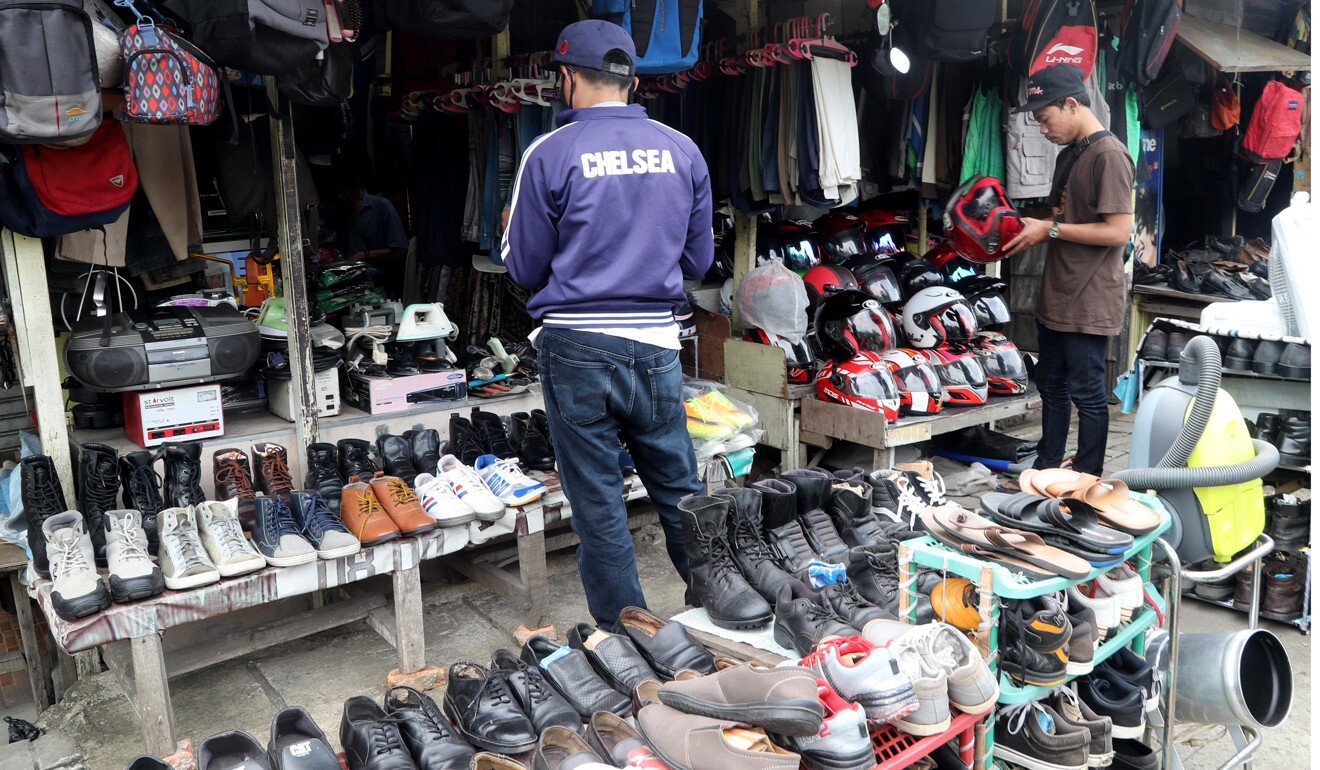
Explainer | Why are Indonesians protesting the Omnibus Law if Jokowi says it will boost jobs and investments?
- President Joko Widodo’s administration is proposing a new bill as part of economic reforms to simplify regulations and encourage investment
- Celebrities and influencers have been promoting the bill but thousands are protesting against it, citing human rights and environmental concerns
Central to Widodo’s reforms is the Omnibus Law, also known as the jobs creation bill, which would simplify overlapping regulations as a means of attracting more foreign investment and boosting the economy.

But it has sparked criticism from academics, members of civil society and grass-roots movements which have called for more transparency, saying the government did not sufficiently engage with the public in discussing the proposed law’s contents. There have also been concerns over how it could affect the country’s environment, human rights and labourers.
For months, many Indonesians – among them labour unions – have taken to the streets to oppose the law. Thousands of people, including labourers and students, joined a rally outside parliament on Friday against the planned changes, while labour unions will hold another protest in 20 Indonesian provinces on August 25.
Indonesian unionists threaten to paralyse Jakarta over Omnibus jobs law
Meanwhile, Jaringan Bonus Demografi (Demographic Bonus Network) coordinator Yoki Yusanto recently told Indonesian newspaper Koran Tempo that his group paid 22 celebrities and influencers between 1.5 million and 10 million rupiah (around US$101 to US$677) each to show support for the Omnibus Law on social media using the hashtag #IndonesiaButuhKerja or #IndonesiaNeedsJobs.
He said the budget came from joint funding by young entrepreneurs and academics without disclosing any details, adding that the money was not sourced from the government – although many Indonesians did not buy the latter claim.
What is the Omnibus Law?
Widodo, popularly known as Jokowi, first made a reference to the Omnibus Law during his inauguration speech last October after being re-elected, saying it would revise “dozens of laws that hinder job creation”.
Besides manpower, the law will cover 10 other areas ranging from ease of doing business and land procurement to investment requirements and the imposition of sanctions.
Analyst Kevin O’Rourke wrote in the latest edition of his Reformasi Weekly newsletter that the president has prioritised the bill as “the administration’s signature effort at economic reform”.
Indonesia’s president says pandemic can spur ‘big leap forward’ for economy
“A chief feature of the bill is a revision of Law #13/2003 on Labour, to relax rigidities that have hampered investment in labour-intensive industries,” O’Rourke wrote. “Meanwhile, job creation is lacking in significant part because of rigidities in the Labour Law: strict rules on hiring-and-firing and severance pay tend to deter new investors from entering Indonesia and creating jobs.”
Ahmad Ali, head of the parliamentary delegation of the NasDem party that supports the bill, recently told local media that the law is expected to be completed in September.
What will the bill change and regulate?
Glenn Wijaya, an associate at the Jakarta-based law firm Christian Teo & Partners, described the bill as “a very effective piece of legislation”.
“Imagine waiting for years to have all of these laws to be amended or replaced one by one through the [yearly] national legislation programme,” said Wijaya, whose firm often advises foreign companies entering the Indonesian market.
“If Indonesia wants to increase its ease of doing business and to remain competitive in Southeast Asia, the Omnibus Bill is a sort of panacea that will cure some of the deficiencies of the current laws.”
Analysis: Under the Jokowi government, corruption still haunts Indonesia

But Bivitri Susanti, co-founder of the Indonesian Centre for Law and Policy Studies, said the bill’s drafting stage had been “kept secret” from the general public, with those who came up with it comprising entrepreneurs and a “very small circle of people”.
“In terms of content, this bill is also problematic because it contains too much relaxation in labour, environment, licensing, land and others for the sake of attracting investments,” she said.
“This bill also marginalises the role of local governments and a lot of authority is drawn to the central government.”
René Pattiradjawane, associate fellow at The Habibie Centre think tank in Jakarta, said it would take two to three years to see results given that investments had stalled because of the pandemic. But he added: “China will always welcome efforts to simplify and expedite its investments, its trade flows.”
Explainer: Why fears of communism, anti-China sentiment are a potent mix in Indonesia
Why is there so much opposition and what are their concerns?
Opponents of the Omnibus Law say it has the potential for great damage.
In an August 15 statement, the Indonesian Trade Union Confederation said the law could reduce the value of severance pay as well as implement “exploitative” working hours.
The bill would make it “easier” for unskilled foreign workers to enter Indonesia without written permission from the minister responsible, while also reducing health insurance and workers’ pensions with a lifelong outsourcing system, the unions added.
Indonesia calls for rethink on Asean pact as foreign investment sinks
Environmental watchdog Greenpeace Indonesia said the bill would threaten the country’s environment since investments will set aside such protections as well as worsen forest fires and the impact of climate change.
Jasmine Puteri, senior forest campaigner at Greenpeace Indonesia, said the environmental impact analysis required for companies would be “weakened”, resulting in indigenous communities being increasingly marginalised. Based on her team’s analysis, she said the landownership cap set to be dominated by companies will make it more difficult for people to acquire their rights and access over land.
“Before the Omnibus Law alone, environmental damages had occurred. With this Omnibus Law, it will be even worse,” she said.
The government-backed National Commission on Human Rights also issued a statement on August 13, calling for the president and parliament to end discussions of the Omnibus Law as “the politics of punishment in the job creation bill has a discriminatory nuance”, adding “it further guarantees the interests of a group of people” and “denies the right to equality before the law”.
Protesting Indonesian students threaten to deport Chinese workers
Is the bill needed given the dire state of economy?
Indonesia’s national development planning ministry projected there would be 10.7 to 12.7 million unemployed Indonesians by 2021, out of a population of 270 million. The pandemic has so far forced around 3.7 million people out of work.
David Sumual, chief economist at Bank Central Asia, said the Omnibus Law is only likely to start benefiting Indonesia’s economy from 2022 onwards as the pandemic’s economic impact continues to be felt into next year.
Indonesia wants firms relocating from China. Why aren’t they coming?
“This year stabilise [the economy] first, so it is an opportunity to improve regulations, improve our business environment, our bureaucracy,” Sumual said.
“So that later when the global economy starts to recover, we will be more competitive.”

However, there are still concerns about how the bill could affect blue-collar workers given that Jokowi’s economic policies are based at least in part on natural resources extraction, according to the chief of a Jakarta-based NGO focusing on trade and investment issues in Indonesia.
“The Omnibus Law is only more about making it easier for corporations to carry out more extensive monopolies,” said Rachmi Hertanti, executive director of Indonesia for Global Justice.

